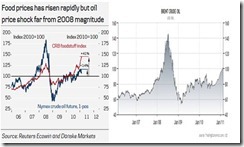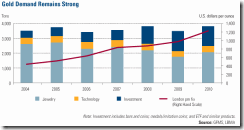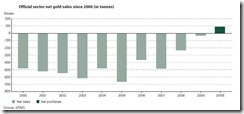By the way, full employment was one of the main justifications for the Reichsbank's inflationist monetary policies. So nothing has changed. Central bankers still believe that monetary policy can lower the unemployment rate. Patrick Barron The Nightmare of 1923 and Its Cause
Don’t look now, but gold is surging right back! (I have to wait for a successful test of 1,430 before I could blurt out ‘I told you so’[1])
If gold is surging right back, then it is likely that global equity markets will follow gold’s path. And this includes the Philippine Phisix.

Figure 1: Stockcharts.com: Phisix-Gold
We’ve been saying that gold has been a reliable barometer of the equity markets.
As you can see in figure 1, gold (black line main window) seems highly correlated with the actions of the Phisix (candle chart main window), as well as with the movements of key emerging markets as the BRIC (Brazil, Russia, India and China via BKF) as well as ASEAN equities (via FSEAX).
However such correlation doesn’t imply causation. The link between gold and emerging markets can be traced to concerted monetary inflationism by global central banks most especially by the Fed’s QE programs.
And places which were said to suffer from the risks of deflation, as the US[2], UK[3] or Euro[4], have actually been experiencing the opposite—inflation has begun to seep in and has even been accelerating.
Earlier, mainstream had been telling us that inflation wouldn’t be a factor. How consistently ‘spectacularly’ wrong they have been[5].
Inflation hasn’t just been manifested in the asset markets but has also been spreading throughout the commodity space (see figure 2).

Figure 2: Price Shocks in Food and $100 Brent Crude (sources: Danske Bank[6] and tradingeconomics[7])
Some in mainstream media has pointed to the soaring food and energy prices[8] as representing effects of the unfolding political events in the Middle East and Africa.
However the causation has, in fact, been the opposite—the unintended effects of the cocktail mix of monetary, fiscal and administrative policies of global governments has caused a widespread boom (signs of crack up boom) in commodity prices that has partly added to the public’s political discontent which have led to the spate of unrest in many countries. While rising food and energy prices has functioned as trigger, there are deeper underlying problems from which has caused the public to vent their dissatisfaction.
Concerns of the risks of supply shocks represent as only ‘secondary’ effects or as a feedback mechanism from the main cause—government inflationist policies.
The False Allure Of Negative Knowledge
This reminds me of Nassim Nicolas Taleb’s “Subtractive Prophecy” knowledge theory where the knowledge of the consensus can be characterized as generally “negative”.
Mr. Taleb’s proposition holds that (from his forthcoming “must buy” book-AntiFragility[9]): [bold emphasis mine]
we know a lot more what is wrong than what is right, or, phrased according to the fragile/robust classification, negative knowledge (what is wrong, what does not work) is more robust to error than positive knowledge (what is right, what works). So knowledge grows by subtraction, a lot more than addition —given that what we know today might turn out to be wrong but what we know to be wrong cannot turn out to be right, at least not easily.
Mr. Taleb’s negative knowledge theory melds with my own when I alluded to why many celebrity gurus remain highly popular[10] despite being constantly ‘spectacularly’ wrong on their predictions—the public may not all be concerned with what really works but espouses on what may seem as the traditionally or conventionally accepted wisdom. Peer pressure, or the informational bandwagon, seems to be the single most influential factor in disseminating ‘negative knowledge’.
In addition, a secondary factor could one of projecting the acquisition of ‘positive knowledge’ built around empiricism modelled through scientism or as Professor Russ Roberts writes[11], “the use of the language and tools of science to reach a conclusion that is not merited”.
In short, scientism could signify a form of social signalling aimed at exhibiting one’s intellectual prowess through math based models.
Or simply said, the desire to build self esteem or social capital by projecting themselves as intellectuals. Thus, much of mainstream’s actions have hardly been about the quest to achieve positive knowledge, instead they are focused on sprucing up image or reputation for the intent of social interactions.
As prudent investors our main concern should not be about what is conventionally accepted, but about being right, and importantly, what works. That’s because return of investments depend on ‘positive knowledge’ rather than the false allure or the wishful thinking from a top-down engineered social utopianism.
Soaring Gold Investment ‘Reservation’ Demand
It is important to also point out that as we have been predicting[12], the demand composition for gold has been shifting from a typical commodity to one of money, and this has been represented by the substantial expansion of ‘investment’ demand (figure 3).

Figure 3: US Global Investors[13]: Changing Composition of Gold’s Demand
Investment demand for gold leapt 70% in 2011 with China as a big factor in the demand growth.
According to this Bloomberg report[14],
Investment demand in 2010 jumped 70 percent and consumption by the jewelery sector gained to a record, it said. Investment was 179.9 metric tons, surpassing Germany and the U.S., as buyers sought out gold bars and coins, according the London- based industry group. Demand from the jewelry sector was 400 tons, it said....
Chinese investors have shown great enthusiasm amid lack of other alternative investments,” Wang Lixin, China representative for the council, said today in Beijing. Wang said the forecast was a “conservative estimate.”
As for the supposed reasons for such growth in demand, the same Bloomberg article quotes a report from the World Gold Council...
“The main motivation behind this demand has been concern over domestic inflation pressure and poor performance of alternative investments, combined with expectations of further gold price gains,” the council said in a report released today.
Again the report only further confirms what we have repeatedly been talking about—a shift of gold’s demand dynamics to one of ‘reservation demand’. As I previously wrote[15],
“money’s “store of value” is increasingly being factored into gold prices (unit of account). Hence, relative to gold pricing, this implies that reservation dynamics or the reservation model (and not consumption model) determines gold valuations or that the exchange ratio or monetary valuations relative to fiat currency applies-- where valuations are determined by the expected changes in relationship between the relative quantity of, and the demand for, gold as money vis-a-vis paper currencies.”
So while jewellery still accounts for as the largest demand for gold, the gist would likely shift towards investments. Nevertheless, statistics can’t assimilate on what people actions represent.
Applied to gold, people can buy jewellery not only for aesthetics or for ornamental purposes, but also as investments.
Official Buying And Monetary Stablization

Figure 4: WGC: Official Purchases First Time in 21 Years
It hasn’t been only the man on streets and the financial markets whom has contributed to a surge in the demand for gold. Governments, perhaps, may have equally been afraid of their own shadows and have begun to stockpile.
In 2010, the official sector, writes the World Gold Council[16], became a net buyer of gold for the first time in 21 years. (see figure 4)
Two factors seem to bear this out, one emerging markets became significant net buyers and secondly, Europe, with significant gold holdings, has greatly reduced their traditional sales activities.
The end in the streak of official selling, should serve as a pellucid and practical example of the error prone predictive value of rigidly relying on statistics and or on the anchoring effect (linear expectations) of past performances. Numbers cannot and will not substitute for people’s actions (this includes the government, who are also comprised of individuals).
As to whether the shift in the attitudes of some governments as reflected by their gold buying patterns would parlay into prospective policies would be another matter.
Yet unless governments act in the way a gold standard is in place (which is to severely downsize on the welfare state and various forms of political economic interventionism), or that government democratizes the banking system to allow for mass competition (by dismantling the banking cartel structure), we are not likely to see governments stabilize the monetary system soon. Adjustments will likely happen at the brink of or during a crisis or what I would call the Mises Moment.
That’s because central banks can always surreptitiously work for the state’s political agenda camouflaged by the esoteric nature of the operations of central banking.
In the fitting and resonant words of Henry Ford,
It is well enough that people of the nation do not understand our banking and monetary system, for if they did, I believe there would be a revolution before tomorrow morning.
So while the fiscal side of governments may be scrutinized by a vigilant public over the perceived profligacy of a government, central banks actions can and will likely substitute for such a loss.
In the US the Federal Reserve’s recent actions appear to reflect on this.
Fund manager Axel Merk glibly explains[17],
Many of the Fed’s policies since the onset of the financial crisis have not been traditional monetary policies: a central bank usually applies a very broad brush in managing economic growth by controlling levers such as interest rates or money supply. However, when the Fed, for example, bought mortgage-backed securities (MBS), it steered money to a specific sector of the economy. That’s fiscal, not monetary policy, traditionally reserved for elected policy makers in Congress. Just like the MBS program, many of the Fed’s policies continue to appear to be attempts at addressing the “shortcomings” of Congress.
In short, what the Congress cannot do, the central bank can.
So any talk of monetary stability should translate to the reining of the actions of central banks or to a more radical extent—abolishing the central banking platform.
Alternatively this also means that given the absence of popular discontent with central banking, the monetary skulduggery can and will likely go on, in spite of globalization or the internet.
Thus, like all price trends, gold will not go up on a straight line but will sporadically encounter severe headwinds, as seen in the previous months.
Nevertheless, the general trend for gold is that it will continually move higher, and most importantly, increasingly assimilate more of money’s characteristics in the face of the persistent central bank manipulation of the monetary system coupled with competitive debasement for political goals.
Even in the political front we seem to be seeing the evolution of gold as money gain significant ground.
I mentioned earlier the World Bank Chief Robert Zoellig[18] has called for the inclusion of gold in monetary reforms. This seems to be shared too by Kansas Federal Reserve President Thomas Hoenig[19] whereby Mr. Hoenig says gold standard is "legitimate”. And so with 10 US states which had “introduced bills in the past few years to allow state commerce to be conducted with gold and silver.[20]”
Moreover, there has been NO fear factor or fear premium in gold[21] as the vicissitudes (rise and fall) of gold prices has been along with risk assets.
To stubbornly insist on this is to put misplaced belief rather than acting on the basis of evidence required for any serious examination.
Having said so, with the momentum of gold seemingly regaining the upside path, we are likely to see a similar price inflation on equity assets as gold and equity prices have shown strong correlations.
This is most likely to be seen on many emerging market bourses that has started the year on the wrong side of the fence.
The Philippine Phisix included.
[1] See Gold Fundamentals Remain Positive, January 31, 2011
[2] Wall Street Journal, Deja Deflation Fear, February 18, 2011
[3] bbc.co.uk UK inflation rate rises ‘hitting savers’, February 15, 2011
[4] Bloomberg.com Trichet Says ECB Doesn’t Exclude Possibility of Inflation Risks, February 19, 2011
[5] See Inflation Expectations: The Widening Chasm Between Households And Experts, February 12, 2011
[6] Danske Bank, Inflation so far not a risk to growth February 17, 2011
[7] Tradingeconomics.com, Brent Crude
[8] Bloomberg.com Brent Crude Trades Near Two-Year High on Mideast Supply Concern, February 17, 2010
[9] Taleb Nassim Nicolas Anti Fragility, How To Live In A World We Don’t Understand, Chapter 5, How (NOT) To Be A Prophet fooledbyrandomenss.com
[10] See Explaining Popularity In Terms of Predictions: Dr. Nouriel Roubini’s Case, February 17, 2011
[11] Roberts Russ Scientism, Cafe Hayek, January 10, 2011
[12] See Is Gold In A Bubble?, November 22, 2009
[14] Bloomberg.com China 2011 Gold Investment May Jump 50%, Council Says, February 17, 2010
[15] See What Gold’s Latest Record Prices Mean, June 21, 2011
[16] World Gold Council, Gold Demand Trends Full year 2010
[17] Merk Axel, Politics of Inflation, safehaven.com February 16, 2011
[18] See World Bank Chief Robert Zoellig: Bring Gold Back As Part Of The New Monetary Order, November 9, 2010
[19] Reuters.com Fed's Hoenig says gold standard "legitimate", January 5, 2011
[20] TPMDC, At Least 10 States Have Introduced Gold Coins-As-Currency Bills, January 5, 2011
[21] See Four Reasons Why ‘Fear’ In Gold Prices Is A Fallacy, April 26, 2009








